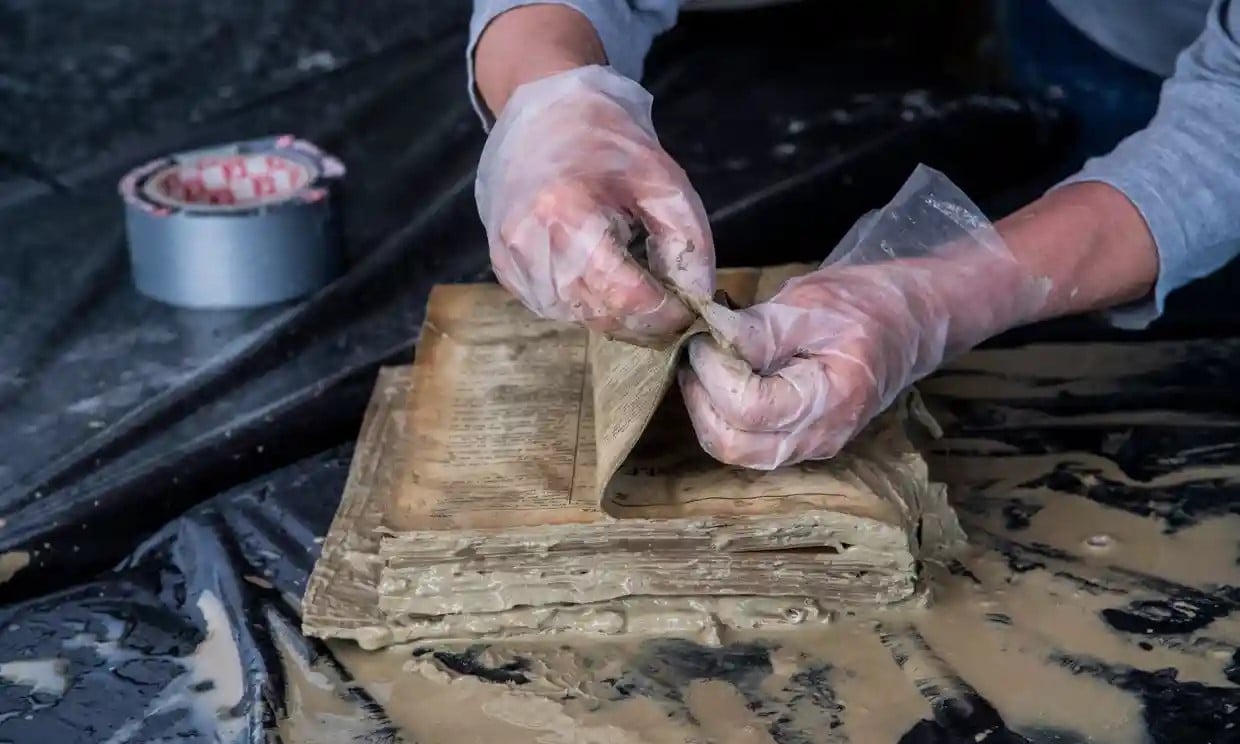After the worst flood in a hundred years in the Emilia-Romagna region of Northern Italy, many ancient books and valuable documents were submerged and had to be urgently rescued if they did not want to lose this priceless heritage.
 |
| Devastating floods in the Emilia-Romagna region of northern Italy have left many ancient books and precious documents submerged in mud and water. Photo: Serrano/AGF/Shutterstock |
As the authorities and residents of Emilia-Romagna begin the arduous task of cleaning up the aftermath of the disaster, the devastating toll on the region’s rich cultural heritage is only beginning to be fully appreciated. Many museums, libraries and churches were submerged, with books, documents and frescoes covered in mud.
Hundred years of heritage
In Cesena, in the province of Forlì-Cesena (Emilia-Romagna), one of the worst affected areas, the historic Malatestiana Library - a UNESCO World Heritage Site - was flooded, housing many ancient books and precious documents.
Among the flooded books and documents, some date back to the 16th century. To save them, volunteers had to transport them all to another location in Cesena, where they were placed in industrial freezers with a temperature of -250C provided by the frozen food company Orogel.
“We have always used this freezing process to treat ripe fruit and vegetables within three hours of harvest, but I never thought that this rapid freezing process could also be useful for our literary heritage,” Bruno Piraccini, president of Orogel, told the Italian news agency Ansa. “I received an unexpected request from the library of Forlì and we are very excited to reorganize the space in our warehouse,” Bruno added.
The storms, followed by floods and landslides in northern Italy, have left 15 people dead and forced thousands to flee their homes, while some 500 roads have been temporarily closed. Heavy rains have continued to batter other parts of the country over the past week, with one person dead in the southern province of Avellino. Italian Prime Minister Giorgia Meloni and European Commission President Ursula von der Leyen also visited the disaster-hit area by helicopter on May 25.
In addition to the human and property losses, the damage to Italy's cultural heritage in this terrible flood was also enormous. According to preliminary statistics, 75 cultural works, 12 libraries and 6 archaeological sites were flooded.
Saving books is like putting out a fire.
Lucia Borgonzoni, Italy's deputy minister of cultural heritage, said the government has set aside a budget of around 6 million euros to help with the disaster at cultural heritage sites. "The campaigns to protect historical heritage have been launched since May 23. At the same time, warehouses to store saved documents are being searched," said Lucia Borgonzoni. Italian Prime Minister Georgia Meloni announced that the price of admission to museums nationwide will be temporarily increased to raise more money to help the Emilia-Romagna region rebuild after the disaster.
The most affected by the floods were the books in the basement library of the San Benedetto convent school in Cava, a small village in the province of Forlì, and those kept in the archives of the Forlì town hall. In addition, the ancient books rescued from the flooded Trisi library in Lugo were put in plastic bags and transported in vacuum-sealed boxes to industrial freezers in Cesena.
The purpose of freezing at such a low temperature is to reduce the amount of water absorbed in the book, prevent further damage and restore it to its original state as soon as possible. Because after freezing, the water absorbed in the book will turn into gas, evaporate, and the book will dry faster.
For the best results, waterlogged books need to be frozen as quickly as possible. Mr. Piraccini said his company would be willing to donate freezers to preserve these priceless ancient books “for the good of the community.” “Our factory is dedicated to preserving the best quality,” he said.
TRAN DAC LUAN (according to Guardian, Euronews)
Source link




















































![[Maritime News] More than 80% of global container shipping capacity is in the hands of MSC and major shipping alliances](https://vphoto.vietnam.vn/thumb/402x226/vietnam/resource/IMAGE/2025/7/16/6b4d586c984b4cbf8c5680352b9eaeb0)













































Comment (0)